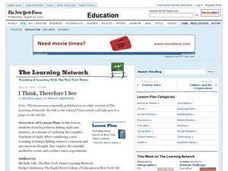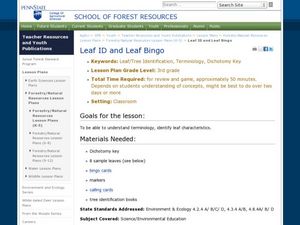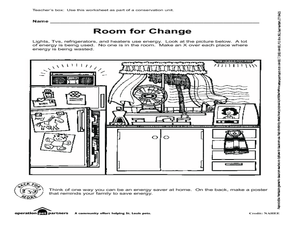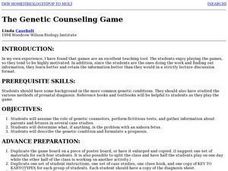Curated OER
Matter Jeopardy
Fourth graders explore science by participating in a Jeopardy style game. In this matter lesson, 4th graders define matter and identify the characteristics and properties of it. Students collaborate in two teams and utilize a SMART board...
Curated OER
Blue Planet: Seas of Life - Tidal Seas
After viewing the video Blue Planet: Seas of Life, students review oceanic concepts. In this earth science lesson, students reflect on the effect tides have on living things and conduct research to create a "tidal trivia" game. Students...
Curated OER
The Race
Students play game simulating route turtle hatchlings take from clutch to ocean, and describe threats hatchlings face and how this affects the marine turtle population.
Curated OER
I Think, Therefore I See
Students participate in a memory experiment to discover how the eye works. After reading an article, they analyze a new technique which examines how the brain registers sight. They develop their own memory game and conduct trials using...
Curated OER
Acting Like a Hog
Students explore game theory. In this secondary mathematics lesson, students plat the game of HOG using dice and explore the optimal strategies. Students play the game three ways: any number of dice, a fixed number of dice and using...
Curated OER
How Electric Current Produces Energy
Fifth graders are introduced to the concept of electric currents. In groups, they develop their own game board to test different circuits to determine if they are complete. They record their observations of the energy transfer between...
Curated OER
Lessons: Food Web
Young scholars use an interactive web-based food web game to gain familiarity with tropic levels and interactions. They already understand that in an ecosystem there are four basic tropic levels: producers, primary consumers, secondary...
Curated OER
A Date With Chemistry
Students research certain elements and then analyze their potential bonds with other elements in a dating game where the dating pool is comprised of the elements featured on the Periodic Table.
Curated OER
Just Can't Get Enough
Students research modern addictions and create public service announcements about them. They research modern additions such as food, shopping, and video games.
Curated OER
What's All the Buzz About
Students participate in a game of charades to examine different animal behaviors. After reading an article, they discuss why bees waggle and how that behavior applies to humans. They research the behaviors of an animal of interest to...
Curated OER
Leaf ID and Leaf Bingo
Third graders explore the parts of a leaf and use a dichotomy key to identify leaves. In this biology lesson, learners study characteristics of various leaves and play a game of bingo to identify leaves by their traits. Students find and...
Curated OER
Career & Technology Education Introduction to Farming: Seeds of Successful Marketing
Students play an agronomy game. In this agriculture lesson plan, students explore modern farming practices pertaining to the cultivation of grains as they play a game that requires them to act as agronomy specialist as they apply their...
Curated OER
Fahrenheit Follies
Second graders analyze the effects of sunlight on a glass of water by using the thermometer to measure its temperature. They predict and measure the difference between water outside in the sun and shade and inside. They role-play a game...
Curated OER
Shadow Play
Students investigate shadows. In this shadows and technology lesson, students listen to the book Ten Grouchy Groundhogs or Gretchen Groundhog, It's Your Day! and discuss how shadows are made. Students match objects to their shadow...
Curated OER
Lesson on Proteins
Students examine the importance of proteins including their function and structure. In this protein lesson students play a game to help them better understand proteins.
Curated OER
Deforestation, Fragmentation, and the Edge Effect
Students participate in an activity to demonstrate how deforestation, fragmentation, and habitat edges may affect native animal populations. Students accomplish this by playing a game from a provided worksheet and completing a graphing...
Curated OER
Food Chains
Fourth graders study food chains, producers, consumers, and decomposers. They play a food chain game and create food chain mobiles or posters. They take a nature hike around the school and observe various parts of a food chain.
Curated OER
Classifying Vertebrates
Second graders study animal characteristics and classification. In this animal characteristics and classifications activity, 2nd graders determine how to classify vertebrates which include mammals, reptiles, amphibians, birds, and fish....
Curated OER
Dolphins
Students explore sea life. In this cross curriculum fine arts, science, and P.E. "dolphins" lesson, students sing songs and play games about dolphins, perform water experiments, create mosaics, and use their five senses to explore sand...
Curated OER
The Effects of Pesticides on the Food Chain
Fourth graders generalize that all animals, including people, depend on plants as a food source. In this science lesson plan, 4th graders describe and construct a food chain, tell how pesticides enter the food chain, and discuss possible...
Curated OER
Save the Earth, it's Everyone's Home!
Students examine trash for items to recycle and reuse. In this trash lesson plan, students explore how people in the community can use recycled and reused items as they play a recycling game.
Curated OER
Binary and Communication Systems
Students participate in an activity that introduces them to the concept of binary coding as a language. They decode messages using special boards that has its own code for different letters. They create new codes by rearranging wires...
Curated OER
Pest Populations: A Game of Survival
Students identify and classify populations of pests in the home, school and community. They recognize the specific conditions needed for the survival of an organism considered a pest and list tactics for control measures.
Curated OER
The Genetic Counseling Game
Students explore genetics and ethical issues. They siimulate the role of genetic counselors, perform fictitious tests, and gather information about parents and fetuses in case studies. Students describe the condition and formulate a...

























